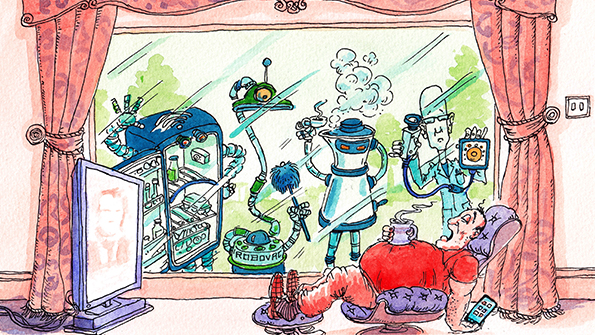THE fanfare has gone on for years. Analysts have repeatedly predicted
that the “internet of things”, which adds sensors and internet
capability to everyday physical objects, could transform the lives of
individuals as dramatically as the spread of the mobile internet.
Providers have focused on the home, touting products such as coffee pots
that turn on when the alarm clock rings, lighting and blinds that
adjust to the time of day, and fridges that send an alert when the milk
runs out. But so far consumers have been largely resistant to making
their homes “smart”.
That’s not for want of trying by tech firms, which have poured cash
into their efforts to connect everyday objects to the internet. In 2014
Google made the biggest statement of intent so far, spending $3.2
billion to acquire Nest, a smart thermostat-maker, and $550m to buy
Dropcam, which makes home-security cameras. Nest absorbed Dropcam; it is
now one of the best-known smart-home brands. But it is also a warning
about how long it will take for such gadgets to enter the mainstream.
Nest has undoubtedly disappointed Google. It sold just 1.3m smart
thermostats in 2015, and only 2.5m in total over the past few years,
according to Strategy Analytics, a research firm. For a couple of years
the firm has mainly tweaked existing products rather than introducing
new ones. That may explain why Tony Fadell, Nest’s founder and boss,
stepped down on June 3rd to take an advisory role at Google’s parent
company, Alphabet (see
article). Mr Fadell, a former executive at Apple and designer of the iPod, failed to bring his magic touch to the smart home.
Nest’s problems are symptomatic. Only 6% of American households have a
smart-home device, including internet-connected appliances,
home-monitoring systems, speakers or lighting, according to Frank
Gillett of Forrester, a research firm. Breakneck growth is not expected;
by 2021 the number will be just over 15% (see chart). Too few consumers
are convinced that the internet has a role to play in every corner of
their lives. A survey conducted in Britain by PricewaterhouseCoopers, a
consulting firm, found that 72% of people have no plans to adopt
smart-home technology in the next two to five years and that they are
unwilling to pay for it. Last year consumers globally spent around $60
billion on hardware and services for the smart home, a fraction of the
total outlay on domestic gadgets.


No comments:
Post a Comment